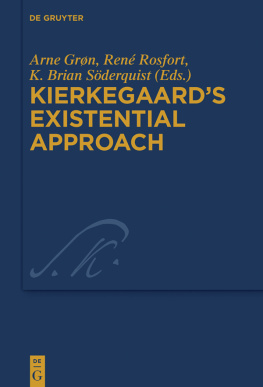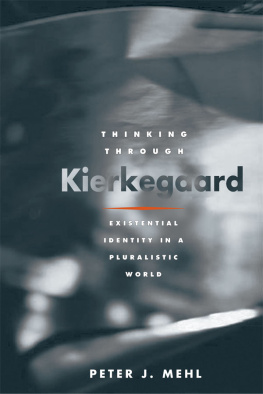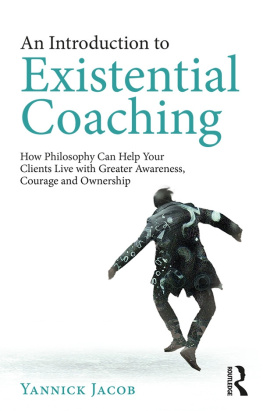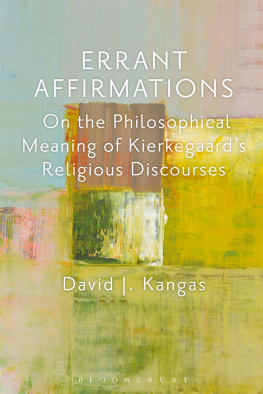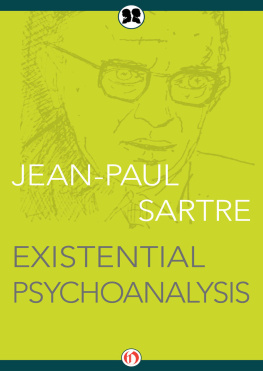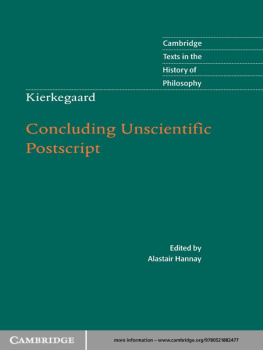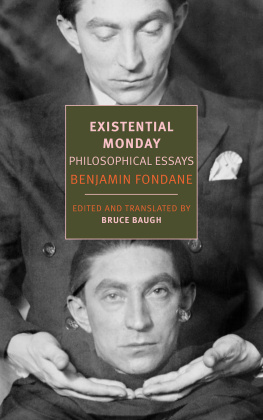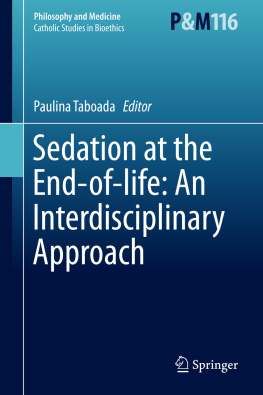Table of Contents
Guide

Kierkegaards Existential Approach
Kierkegaard Studies

Edited on the behalf of
Sren Kierkegaard Research Centre
by Heiko Schulz, Jon Stewart and Karl Verstrynge
in cooperation with Peter ajda
Monograph Series 35
Edited by
Karl Verstrynge
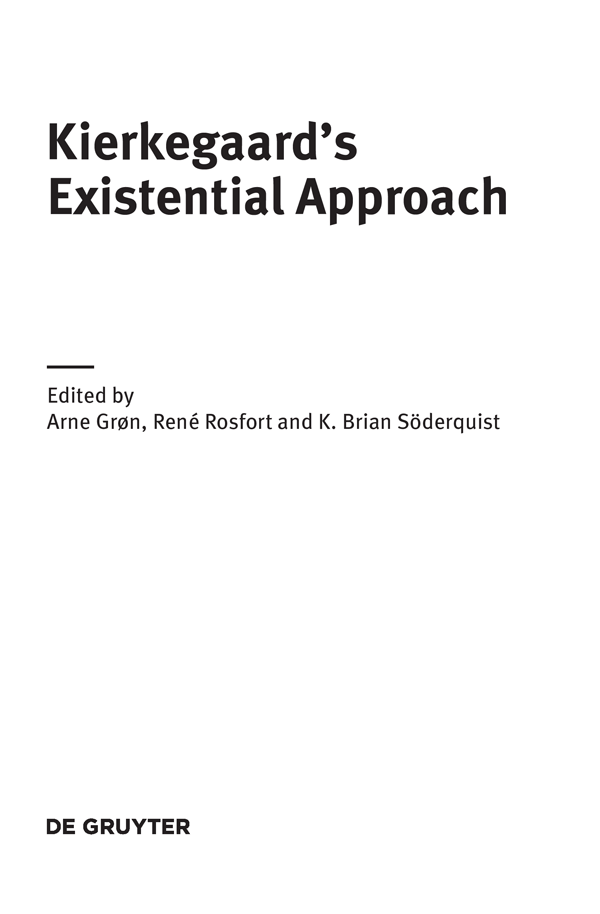
Kierkegaard Studies
Edited on behalf of the Sren Kierkegaard Research Centre
by Heiko Schulz, Jon Stewart and Karl Verstrynge in cooperation with Peter ajda
Monograph Series
Volume 35
Edited by Karl Verstrynge
ISBN 978-3-11-047866-2
e-ISBN (PDF) 978-3-11-049301-6
e-ISBN (EPUB) 978-3-11-049101-2
ISSN 1434-2952
Library of Congress Cataloging-in-Publication Data
A CIP catalog record for this book has been applied for at the Library of Congress.
Bibliographic information published by the Deutsche Nationalbibliothek
The Deutsche Nationalbibliothek lists this publication in the Deutsche Nationalbibliografie;
detailed bibliographic data are available on the Internet at http://dnb.dnb.de.
2017 Walter de Gruyter GmbH, Berlin/Boston
www.degruyter.com
Foreword
Kierkegaards texts are and remain texts for reflection. They provide their reader a unique possibility to ask fundamental questions about what it means to be human. These are questions that connect people across social, cultural, and religious divides. Thus, the importance of Kierkegaards thinking is not just a matter of applying it thematically, but it also requires the reader to take his or her own context into account while thinking with Kierkegaard. This is most apparent when the study of Kierkegaards texts is allowed to challenge or support other ways of asking existential questions. These include not only philosophical and theological approaches to existence, but also aesthetic approaches as well as those of the human, social, and natural sciences.
The Sren Kierkegaard Research Centre (SKC) at the University of Copenhagen was established as a Centre of Excellence in January 1994 with a five year grant from the Danish National Research Foundation. The aim of SKC was originally described as an ellipse, consisting of interdisciplinary interpretations of Kierkegaards thought on the one hand, and, on the other, philological research with the objective of establishing a new critical and annotated edition of Kierkegaards authorship under the title Sren Kierkegaards Skrifter (SKS). The final version of the digital edition of SKS was launched in 2007. Work on the 55 volumes of SKS was completed in 2012 with the last volume published in 2013, the bicentennial year of Kierkegaards birth. This critical and annotated edition of Kierkegaards works, which includes his published works as well as his journals, notebooks, and papers, makes the complexity of Kierkegaards authorship apparent and allows for new perspectives on his thought.
A new textual foundation is not merely a privilege, but also carries with it an obligation to put this new foundation to use. The task of SKC is therefore to use the new edition to reformulate basic categories and problem areas in Kierkegaard studies and to discuss their current importance.
Recent years have seen a renewed interest not only in existentialism, but also in existential questions, as well as key figures in existential thinking. This is perhaps not a coincidence. The intellectual debate is today dominated by a quest for scientific and pragmatic answers to what it means to be human. Reflective disciplines like theology, philosophy, and literary studies are experiencing a growing pressure to deliver workable solutions to societal and personal problems. The contemporary emphasis on science and pragmatism resemblesand can be seen as a return tothe fervent scientific enthusiasm that followed in the wake of the twentieth century, and the interest in existential thinking that made its entry on the intellectual scene after World War I was a critical reaction to this quest for unambiguous solutions to human problems. Although existential thinking comes in various forms, all these forms share a skepticism toward substantial definitions of what it means to be human, and they all draw on a concept of human existence that Kierkegaard was one of the first to articulate and investigate. The contemporary interest in existential thinking can arguably be seen as a similar critical reaction to the prevalent scientific and pragmatic approaches to human existence.
Kierkegaard played a major role in shaping the heyday of existentialism and existential thinking from the 1920s to the beginning of 1960s, and he is still considered to be one of the founding fathers of existential thinking. Despite this honorary title, systematic investigations of Kierkegaards existential approach remain sparse. SKC has therefore dedicated three of its annual conferences to reconsidering Kierkegaards existential approach and its importance for the contemporary interest in existential thinking. The first conference was held in Copenhagen in 2015 under the title SKC Annual Conference 2015: Reconsidering Kierkegaards Existential Approach, and most of the contributions in this anthology were first presented at this conference. The SKC Annual Conferences 2016 and 2017 will continue to investigate aspects of Kierkegaards existential approach.
The 13 chapters of this anthology deal with various aspects of Kierkegaards existential approach. Its reception is examined in the works of influential philosophers such as Heidegger, Gadamer, and Habermas, as well as in lesser known philosophers from the interwar period, such as Jean Wahl, Lev Shestov, Rachel Bespaloff, and Benjamin Fondane. Other chapters reconsider central existential concepts, such as anxiety, existence, imagination, and despair. Finally, there are chapters that deal with Kierkegaards relevance for central issues in contemporary philosophy, including naturalism, self-constitution, and bioethics.
We hope that the various attempts to reconsider Kierkegaards existential approach offered in this book will encourage the reader to return to Kierkegaards texts with new questions that, in her or his own reading of the texts, can beget further questions. This open community of shared questions is a critical aspect of our individual readings of Kierkegaards work and thought.
Arne Grn and Ren Rosfort
Acknowledgements
The editors would like to thank Daniel Benedikt Smith for his careful copyediting of the entire manuscript, and Karl Verstrynge, Bjarke Mrkre Stigel Hansen and Claudia Welz for their help in the editorial process. We would also like to thank the peer reviewers whose careful comments and suggestions have improved the academic quality of the individual chapters. Finally, we would like to thank editorial director Albrecht Dhnert at de Gruyter Verlag, and the general editors of KSMS, Jon Stewart, Heiko Schulz, and Karl Verstrynge, for accepting this anthology into the series.

Reception
Mlissa Fox-Muraton
Philosophy of Existence in France in the 1930s
Abstract: Among the first to seriously introduce Kierkegaards philosophy to the French reading public in the 1930s, Wahl, Bespaloff, Shestov, and Fondane were also engaged in the debate about philosophy of existence. Critical of the existentialist philosophy developed in the 1940s beginning with Sartre, as well as of the existential philosophies promoted throughout Germany and France in the 1930s by Heidegger, Jaspers, and Marcel, Bespaloff, Fondane, Shestov, and Wahl nevertheless all claim to remain faithful to their philosophy of existence, inspired by Kierkegaard. This essay will sketch out their understanding of what philosophy of existence is, through their positions and critiques of their contemporaries and successors.

